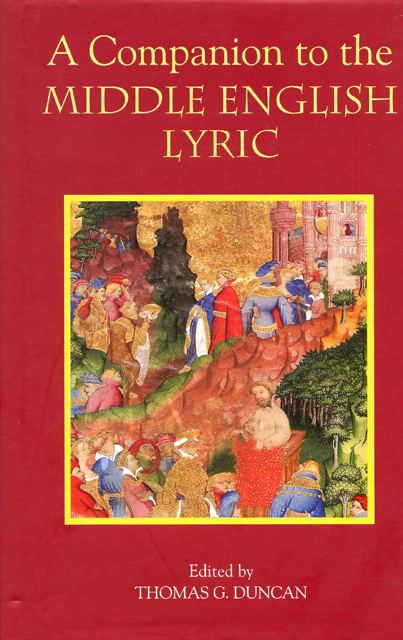Book contents
- Frontmatter
- Contents
- Acknowledgements
- Abbreviations
- Editorial Note
- Introduction
- 1 Middle English Lyrics and Manuscripts
- 2 Middle English Lyrics: Metre and Editorial Practice
- 3 The Love Lyric before Chaucer
- 4 Moral and Penitential Lyrics
- 5 Middle English Religious Lyrics
- 6 Middle English Courtly Lyrics: Chaucer to Henry VIII
- 7 The Middle English Carol
- 8 Political Lyrics
- 9 The Lyric in the Sermon
- 10 ‘Cuius Contrarium’: Middle English Popular Lyrics
- 11 Gender and Voice in Middle English Religious Lyrics
- 12 Lyrics in Middle Scots
- Bibliography of works cited
- Index of Manuscripts Cited
- General Index
- Index of Lyrics
8 - Political Lyrics
Published online by Cambridge University Press: 23 March 2023
- Frontmatter
- Contents
- Acknowledgements
- Abbreviations
- Editorial Note
- Introduction
- 1 Middle English Lyrics and Manuscripts
- 2 Middle English Lyrics: Metre and Editorial Practice
- 3 The Love Lyric before Chaucer
- 4 Moral and Penitential Lyrics
- 5 Middle English Religious Lyrics
- 6 Middle English Courtly Lyrics: Chaucer to Henry VIII
- 7 The Middle English Carol
- 8 Political Lyrics
- 9 The Lyric in the Sermon
- 10 ‘Cuius Contrarium’: Middle English Popular Lyrics
- 11 Gender and Voice in Middle English Religious Lyrics
- 12 Lyrics in Middle Scots
- Bibliography of works cited
- Index of Manuscripts Cited
- General Index
- Index of Lyrics
Summary
What is a ‘political lyric’? The two terms need definition in relation to one another, and I shall explore them each in turn. It is worth stating the obvious at the outset, that whatever a lyric may be, it does not include major poems such as Wynnere and Wastoure, Langland's Piers Plowman and works by Langland’s successors, especially Mum and the Sothsegger, Gower's In Praise of Peace, Hoccleve's Regement of Princes, Lydgate's Fall of Princes, and others which would all figure prominently in any wider account of political poetry in Middle English. Though the lyrics cannot be fully understood except in the light of this wider tradition, and indeed in the light of Latin and French political verse, they nevertheless illustrate neatly and on a small scale a number of issues in connection with political poetry.
The term ‘political’ can be interpreted narrowly or generously. George Kane has argued that the word has been misapplied to fourteenth-century moral satires, and that it is wrong to understand such poems ‘as manifesting an increasingly secular concern for political change and reform’ (Kane 1986, 82). Kane is undoubtedly right in saying that this is a misinterpretation, but at the same time his contention that ‘political’ is indistinguishable from ‘revolutionary’ cannot be maintained. Peter Coss suggests a division that I find helpful, distinguishing three broad categories of medieval political verse: firstly, poems dealing directly with particular current events; secondly, ‘verses of social protest’ that are ‘responses to particular and topical grievances’; and thirdly, ‘satires attacking either specific vices or the vices of various social classes and groups’ (Coss 1996, xiii). To these I would add a fourth group for consideration: poems on subjects that are not themselves political but have social or political implications.
In the light of these categories I shall first look at some of the famous English lyrics of BL MS Harley 2253, three of which Kane and Coss take up in their discussions. The Harley lyrics provide an excellent starting point for an analysis of the term ‘political’, for this early collection (c.1340) provides some of the finest examples of most of the kinds of political lyric that feature in later manuscripts.
- Type
- Chapter
- Information
- A Companion to the Middle English Lyric , pp. 171 - 188Publisher: Boydell & BrewerPrint publication year: 2005
- 1
- Cited by

